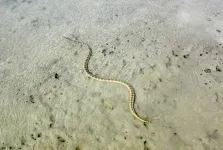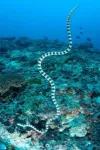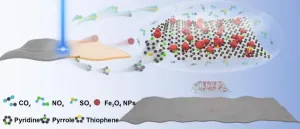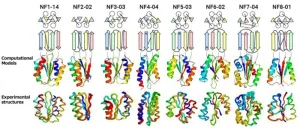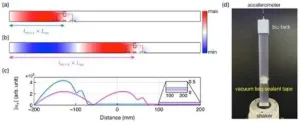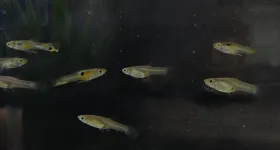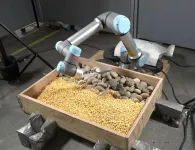(Press-News.org) An international team of scientists examining the genetic history of sea snakes have found that the species has enhanced their colour vision in response to living in brighter and more colourful marine environments.
“Our research has found that the annulated sea snake possesses four intact copies of the opsin gene SWS1,” said PhD candidate Isaac Rossetto, from the University of Adelaide’s School of Biological Sciences who led the study.
“Two of these genes have the ancestral ultraviolet sensitivity, and two have evolved a new sensitivity to the longer wavelengths that dominate ocean habitats.
“The earliest snakes lost much of their ability to see colour due to their dim-light burrowing lifestyle.
“However, their sea snake descendants now occupy brighter and more spectrally complex marine environments. We believe that recent gene duplications have dramatically expanded the range of colours sea snakes can see.”
The team examined published reference genomes to examine visual opsin genes across five ecologically distinct species of elapid snakes. They looked at the gene data of Hydrophis cyanocinctus, or the annulated sea snake, a species of venomous snake found in tropical and subtropical regions of Australia and Asia.
The team included scientists from The University of Adelaide, The University of Plymouth and The Vietnamese Academy of Science and Technology. They published their findings in the journal Genome Biology and Evolution.
Many animals have lost opsins throughout their genealogical history as they’ve adapted to new habitats, but it is very rare to see opsin gains.
“Humans have a similarly expanded sensitivity to colours, while cats and dogs are partially colour-blind much like those early snakes,” said Mr Rossetto.
“It’s quite unique and interesting that these snakes appear to be gaining and diversifying their opsins, when other land-to-sea transitioned animals have done the opposite.”
“Basically, there’s only one other case within reptiles at all where we think this has happened.”
Newly gained colour-vision opsins have also been recorded in the semi-aquatic Helicops snake.
Evidence of colour vision in Hydrophis snakes was first published in 2020, but this new research shows it is the result of gene duplication rather than gene polymorphism. This means expanded colour vision is more common among the species than first thought.
“With a polymorphism, it’s a bit of a lottery – only some individuals would have that extended colour sensitivity. But now we know that there are multiple gene copies which have diverged, so colour vision is expected to be seen in all members of these species,” said Mr Rossetto.
END
Sea snake vision evolved to regain color
2023-07-12
ELSE PRESS RELEASES FROM THIS DATE:
Scientists developed 180% relative bandwidth microwave absorber by ultrafast UV laser
2023-07-12
Scientists from Chinese Academy of Sciences Ningbo Institute of Materials Technology and Engineering, National Physical Laboratory (UK), The University of Manchester (UK) and National University of Singapore have developed a new approach, published in International Journal of Extreme Manufacturing (IF: 14.7), to fabricate a specifically designed wideband microwave absorption metamaterial with well-controlled electrical and magnetic characteristics on a polyethylene terephthalate (PET) substrate using ultraviolet (UV) laser irradiation.
The process involves using a UV laser to precisely control the characteristics of 2-D pattern on a specially formulated donor ...
Beyond nature's imagination: Scientists discover extensive array of protein folds unexplored in nature
2023-07-12
A groundbreaking study has shed new light on the astonishing diversity of protein structures and their folds in nature. Researchers set out to reveal the extent to which nature has explored the vast landscape of possible protein topologies. The results have unveiled an astounding array of unexplored protein folds, expanding our understanding and uncovering the depth of the protein universe.
This research has been published in the journal Nature Structural and Molecular Biology on July 3, 2023.
Proteins, ...
Bound states in the continuum is possible in the acoustoelastic coupling
2023-07-12
Let’s imagine a hypothetical scenario where two individuals are gripping a rope, each holding one end. Person A proceeds to shake the rope in an up-and-down motion, thus generating a propagating wave that travels towards person B. Now, if person C, positioned between person A and B, engages in a comparable frequency of waving motion as that of the rope’s wave, could the wave be redirected back to person A rather than reaching person B? Initially, this situation appears implausible, as person C does not physically ...
Pre-operative exercise substantially helps with recovery – study
2023-07-12
Policy-makers are being urged to take notice of a University of Otago study that confirms that undertaking a short programme of high intensity interval training before surgery can substantially help with recovery.
The study, published in the journal Surgery, reviewed and analysed 12 studies including 832 patients who had undertaken preoperative high-intensity interval training. Such training involves repeated aerobic high-intensity intervals at about 80 per cent of the maximum heart rate followed by active recovery.
Lead investigator Dr Kari Clifford says the study included all types of major surgeries – those expected ...
Scientists developing way to make cheaper Lithium batteries
2023-07-12
Lyon, France: Lithium is becoming the new gold, with rocketing use in lithium-ion batteries in electric cars, computers, and portable devices driving up the price and affecting the supply of the relatively rare metal. Scientists are on the verge of developing a way of using sodium to replace some of the lithium, so driving down costs and guaranteeing the supply.
Recently scientists have looked at dispensing with lithium altogether and instead using sodium or other elements in high quality batteries. Sodium is cheaper and more available (it’s found in seawater, as sodium chloride), but they have ...
Plant Biology 2023 plenary closeup: Connecting the dots
2023-07-12
This year’s Presidential Symposium places plant science within a larger context, spotlighting the connections between plants and humanity. Accordingly, ASPB President Gustavo MacIntosh selected speakers with a broad array of backgrounds and expertise. Yet when the Presidential Symposium takes place Saturday, August 5, at 1:30 pm, you’ll find they agree on critical fundamentals.
“Humans are totally dependent on plants for food,” began Barbara Schaal of Washington University.
“When it comes to agriculture, plants and people are really ...
Tiny fish surprise scientists in ‘volunteer’s dilemma’
2023-07-12
Tiny fish called Trinidadian guppies have surprised scientists when faced with the so-called “volunteer’s dilemma”.
The idea of the dilemma is that individuals are less likely to cooperate if they are in a large group.
Various studies have demonstrated this in humans – but guppies appear to buck the trend.
In the new study, by the University of Exeter, guppies in larger groups were more likely to risk approaching a predator to gather information for the shoal.
“When faced with a possible predator, guppies have to balance risks,” said Rebecca Padget, from Exeter’s Centre for Research in Animal Behaviour.
“At least one ...
Six research centers will lead innovation towards a fully sustainable energy sector
2023-07-12
An investment of £53 million in six research centres will drive forward change in the energy system and help to meet the UK’s net zero target by 2050.
The energy research centres will boost knowledge, create innovative green technologies and reduce demand for energy to achieve greener, cleaner domestic, industrial and transport energy systems.
UK Research and Innovation (UKRI) has awarded:
£15 million for a new Energy Demand Research Centre that will provide solutions for energy demand reduction, understand the impact on consumers, and enable equitable policy decision-making.
£17.5 ...
Training robots how to learn, make decisions on the fly
2023-07-12
Mars rovers have teams of human experts on Earth telling them what to do. But robots on lander missions to moons orbiting Saturn or Jupiter are too far away to receive timely commands from Earth. Researchers in the Departments of Aerospace Engineering and Computer Science at the University of Illinois Urbana-Champaign developed a novel learning-based method so robots on extraterrestrial bodies can make decisions on their own about where and how to scoop up terrain samples.
“Rather than simulating how to scoop every possible type of rock or granular material, ...
Substance use linked to long-lasting brain changes, cognitive decline
2023-07-12
An estimated 50 million individuals in the United States struggle with the challenges of cocaine or alcohol use disorders, according to the National Institutes of Health (NIH). Beyond the well-documented health risks, addiction to these substances detrimentally affects our cognitive flexibility, which is the ability to adapt and switch between different tasks or strategies. Although previous research has hinted at this connection, the underlying reasons for this cognitive impairment remain elusive.
Cognitive flexibility is a crucial element in various domains of our life, including ...
